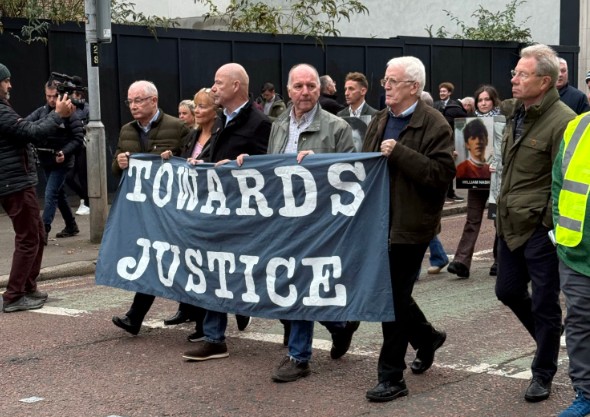The disclosure that the UK Government has spent over£ 4 million defending Soldier F has reignited deep wrath and hurt among the families of Bloody Sunday victims, with numerous calling it a betrayal of once-pledged justice.
Mickey McKinney, whose family member William was one of 13 people killed when British paratroopers opened fire during a civil rights march in Derry in 1972, said the news felt like “a slap in the face” to the victims’ families.
“That money flies in the face of David Cameron’s apology; it was really hurtful,” Mr McKinney told the PA news agency.
The trial and its fallout
Mr McKinney admitted he was stunned when he learned the scale of the Government’s legal spending, which totals £4.3 million. “I was very surprised to hear the total and was left feeling shocked,” he said.
The figure, verified by Veterans Minister Alistair Cairns in response to an administrative question from SDLP MP Colum Eastwood, covers legal and welfare support for the former paratrooper since 2019.
It includes defense costs from when Soldier F was first charged, as well as charges from a judicial review after prosecutors originally halted proceedings.
The former dogface, known only as Soldier F for legal reasons, was acquitted of two counts of murder and five counts of attempted murder in connection with the 1972 Derry blowups.
Judge Patrick Lynch, delivering his verdict at Belfast Crown Court, ruled that the substantiation presented fell “well short” of what was needed for a conviction.
The Soldier F verdict delivered in the Bloody Sunday murder trial continues to spark intense debate over justice, accountability, and how Britain confronts the legacy of its past conflicts.
For the families, however, the outcome, and now the Government’s legal spending, has reopened old wounds.
“Double injustice” for families
Colum Eastwood condemned the multi-million-pound legal bill, branding it a “double injustice” for the victims’ families.
“They’ve endured decades of pain, and now their taxes are paying for the defense of a man accused of killing their loved ones,” he said.
It was not really “the end”.
People now crying about costs for the defence of Soldier F
Will @madden_finucane publish how much money they have received from UK Government in relation to “the troubles”?
How much did Madden and Finucane earn in this case? https://t.co/U4CZsr5dx5
— Norn Eye (@NornEye) October 30, 2025
Thirteen people lost their lives on that cataclysmal day in January 1972, when paratroopers opened fire on peaceful demonstrators.
The tragedy was one of the darkest chapters in Northern Ireland’s history and a defining moment in the Troubles.
Families’ long road to justice
Mr McKinney said many of the relatives, now elderly, dedicated weeks attending the trial in Belfast, traveling daily from Derry. “We wanted it to be held at Bishop Street courthouse, in Derry, where it should’ve been,” he said.
He also dismissed arguments comparing the cost of Soldier F’s defense to the £190 million spent on the Saville Inquiry, which re-examined the events of Bloody Sunday.
“The inquiry was something that should have happened immediately after Bloody Sunday. It should have happened over 50 years ago,” he said.
For the families of the victims, the Government’s ongoing financial support for Soldier F is seen not as an act of fairness, but as a painful reminder that the scars of Bloody Sunday remain unhealed.
What was once hailed as a moment of reconciliation, when David Cameron stood before Parliament in 2010 and apologized, calling the killings “unjustified and unjustifiable”, now feels hollow to those still waiting for full accountability.
As one family member put it: “Every pound spent defending him deepens the hurt that’s lasted half a century.”






